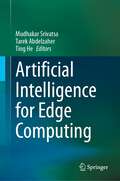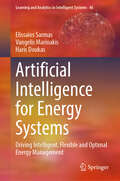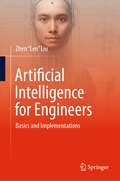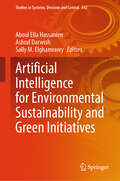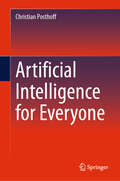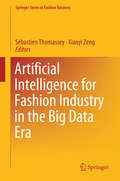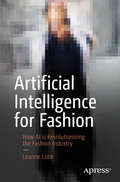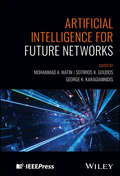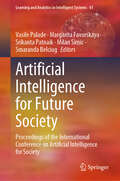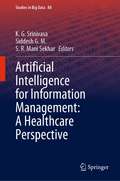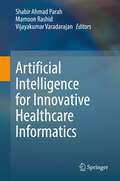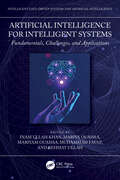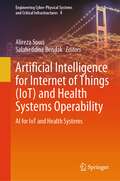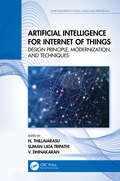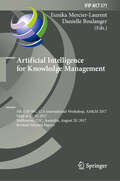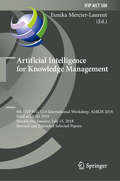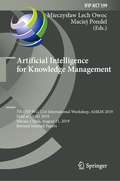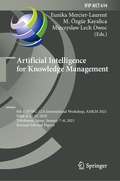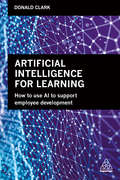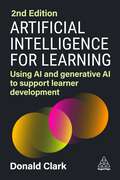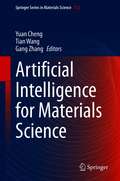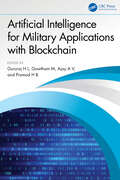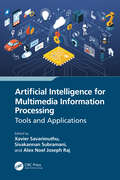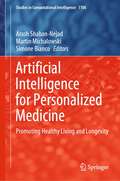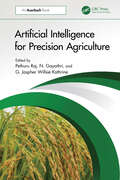- Table View
- List View
Artificial Intelligence for Edge Computing
by Mudhakar Srivatsa Tarek Abdelzaher Ting HeIt is undeniable that the recent revival of artificial intelligence (AI) has significantly changed the landscape of science in many application domains, ranging from health to defense and from conversational interfaces to autonomous cars. With terms such as “Google Home”, “Alexa”, and “ChatGPT” becoming household names, the pervasive societal impact of AI is clear. Advances in AI promise a revolution in our interaction with the physical world, a domain where computational intelligence has always been envisioned as a transformative force toward a better tomorrow. Depending on the application family, this domain is often referred to as Ubiquitous Computing, Cyber-Physical Computing, or the Internet of Things. The underlying vision is driven by the proliferation of cheap embedded computing hardware that can be integrated easily into myriads of everyday devices from consumer electronics, such as personal wearables and smart household appliances, to city infrastructure and industrial process control systems. One common trait across these applications is that the data that the application operates on come directly (typically via sensors) from the physical world. Thus, from the perspective of communication network infrastructure, the data originate at the network edge. From a performance standpoint, there is an argument to be made that such data should be processed at the point of collection. Hence, a need arises for Edge AI -- a genre of AI where the inference, and sometimes even the training, are performed at the point of need, meaning at the edge where the data originate. The book is broken down into three parts: core problems, distributed problems, and other cross-cutting issues. It explores the challenges arising in Edge AI contexts. Some of these challenges (such as neural network model reduction to fit resource-constrained hardware) are unique to the edge environment. They need a novel category of solutions that do not parallel more typical concerns in mainstream AI. Others are adaptations of mainstream AI challenges to the edge space. An example is overcoming the cost of data labeling. The labeling problem is pervasive, but its solution in the IoT application context is different from other contexts. This book is not a survey of the state of the art. With thousands of publications appearing in AI every year, such a survey is doomed to be incomplete on arrival. It is also not a comprehensive coverage of all the problems in the space of Edge AI. Different applications pose different challenges, and a more comprehensive coverage should be more application specific. Instead, this book covers some of the more endemic challenges across the range of IoT/CPS applications. To offer coverage in some depth, we opt to cover mainly one or a few representative solutions for each of these endemic challenges in sufficient detail, rather that broadly touching on all relevant prior work. The underlying philosophy is one of illustrating by example. The solutions are curated to offer insight into a way of thinking that characterizes Edge AI research and distinguishes its solutions from their more mainstream counterparts.
Artificial Intelligence for Energy Systems: Driving Intelligent, Flexible and Optimal Energy Management (Learning and Analytics in Intelligent Systems #46)
by Haris Doukas Elissaios Sarmas Vangelis MarinakisThis book focuses on creating an integrated library of learning models and optimization techniques to assist decision-making on issues in the energy and building sector. It provides modern solutions to energy management and efficiency while addressing a scientific gap in the development of advanced algorithmic methods to solve these problems. More specifically, the focus is on the development of models and algorithms for problems falling into three broader categories, namely: (a) Distributed Energy Generation, (b) Microgrid Flexibility, and (c) Building Energy Efficiency. Artificial Intelligence models and mathematical optimization techniques are developed and presented for applications related to each of these categories, through a thorough analysis of the fundamental parameters of each application as well as the interactions among them. Professors, researchers, scientists, engineers, and students in energy sector-related disciplines are expected to be inspired and benefit from this book, along with readers from other disciplines wishing to learn more about this exciting new field of research.
Artificial Intelligence for Engineers: Basics and Implementations
by Zhen "Leo" LiuThis textbook presents basic knowledge and essential toolsets needed for people who want to step into artificial intelligence (AI). The book is especially suitable for those college students, graduate students, instructors, and IT hobbyists who have an engineering mindset. That is, it serves the idea of getting the job done quickly and neatly with an adequate understanding of why and how. It is designed to allow one to obtain a big picture for both AI and essential AI topics within the shortest amount of time.
Artificial Intelligence for Environmental Sustainability and Green Initiatives (Studies in Systems, Decision and Control #542)
by Ashraf Darwish Aboul Ella Hassanien Sally M. ElghamrawyThis book discusses AI's applications in sustainability, exploring its potential in sectors such as energy, healthcare, agriculture, transportation, and waste management. Discusses applications and innovations in Green Initiatives such as energy, finance, and drug discovery. Highlights the ethical challenges and benefits of integrating AI into sustainability initiatives
Artificial Intelligence for Everyone
by Christian PosthoffThis book demystifies the topic of Artificial Intelligence for readers of varying backgrounds. The content should enable many people to discuss and follow ongoing developments in an informed way, to draw conclusions for their own life and workplace and to acquire the necessary new knowledge. The book strives to provide basic knowledge that will objectify the discussions and relieve some of the creepiness of utopian films. It must also be understood that research results are a necessary condition for progress; they are not sufficient until they can be translated into practice embedded in programs. This difficult relationship between theory and practice has been known for a long time.
Artificial Intelligence for Fashion Industry in the Big Data Era (Springer Series in Fashion Business)
by Sébastien Thomassey Xianyi ZengThis book provides an overview of current issues and challenges in the fashion industry and an update on data-driven artificial intelligence (AI) techniques and their potential implementation in response to those challenges. Each chapter starts off with an example of a data-driven AI technique on a particular sector of the fashion industry (design, manufacturing, supply or retailing), before moving on to illustrate its implementation in a real-world application
Artificial Intelligence for Fashion: How AI is Revolutionizing the Fashion Industry
by Leanne LuceLearn how Artificial Intelligence (AI) is being applied in the fashion industry. With an application focused approach, this book provides real-world examples, breaks down technical jargon for non-technical readers, and provides an educational resource for fashion professionals. The book investigates the ways in which AI is impacting every part of the fashion value chain starting with product discovery and working backwards to manufacturing. Artificial Intelligence for Fashion walks you through concepts, such as connected retail, data mining, and artificially intelligent robotics. Each chapter contains an example of how AI is being applied in the fashion industry illustrated by one major technological theme. There are no equations, algorithms, or code. The technological explanations are cumulative so you'll discover more information about the inner workings of artificial intelligence in practical stages as the book progresses. What You’ll LearnGain a basic understanding of AI and how it is used in fashionUnderstand key terminology and concepts in AIReview the new competitive landscape of the fashion industryConceptualize and develop new ways to apply AI within the workplaceWho This Book Is ForFashion industry professionals from designers, managers, department heads, and executives can use this book to learn about how AI is impacting roles in every department and profession.
Artificial Intelligence for Future Networks
by Mohammad A. Matin George K. Karagiannidis Sotirios K. GoudosAn exploration of connected intelligent edge, artificial intelligence, and machine learning for B5G/6G architecture Artificial Intelligence for Future Networks illuminates how artificial intelligence (AI) and machine learning (ML) influence the general architecture and improve the usability of future networks like B5G and 6G through increased system capacity, low latency, high reliability, greater spectrum efficiency, and support of massive internet of things (mIoT). The book reviews network design and management, offering an in-depth treatment of AI oriented future networks infrastructure. Providing up-to-date materials for AI empowered resource management and extensive discussion on energy-efficient communications, this book incorporates a thorough analysis of the recent advancement and potential applications of ML and AI in future networks. Each chapter is written by an expert at the forefront of AI and ML research, highlighting current design and engineering practices and emphasizing challenging issues related to future wireless applications. Some of the topics include: Signal processing and detection, covering preprocess and level signals, transform signals and extract features, and training and deploying AI models and systemsChannel estimation and prediction, covering channel characteristics, modeling, and classic learning-aided and AI-aided estimation techniquesResource allocation, covering resource allocation optimization and efficient power consumption for different computing paradigms such as Cloud, Edge, Fog, IoT, and MECAntenna design using AI, covering basics of antennas, EM simulator/optimization algorithms, and surrogate modeling Identifying technical roadblocks and sharing cutting-edge research on developing methodologies, Artificial Intelligence for Future Networks is an essential reference on the subject for professionals and researchers involved in the field of wireless communications and networks, along with graduate and PhD students in electrical and computer engineering programs of study.
Artificial Intelligence for Future Society: Proceedings of the International Conference on Artificial Intelligence for Society (Learning and Analytics in Intelligent Systems #41)
by Vasile Palade Srikanta Patnaik Margarita Favorskaya Smaranda Belciug Milan Simic"Artificial Intelligence for Future Society" presents the revolution in future societies by enhancing efficiency, connectivity, and personalization across various sectors. Its future aspects include the integration of AI in everyday life through smart cities, autonomous vehicles, and advanced healthcare systems, providing a more intelligent, responsive, and adaptive environment that meets the evolving needs of humanity. This volume explores the most recent innovations and significant developments in the domains of Artificial Intelligence and its impact in transforming society, propelling innovation across diverse fields such as healthcare, education, finance, and transportation. It spans a wide range of dimensions, including: Societal Diversity Innovation in the Digital Age Business Information Systems Advancement in Healthcare, HSI, and Global Collaboration By merging cutting-edge theoretical insights with practical applications, this volume provides researchers, practitioners, and students with the essential knowledge and tools to explore and advance within the dynamic field of Artificial Intelligence. Artificial Intelligence brings numerous benefits to society, including improved efficiency and productivity in various industries through automation and intelligent data analysis. It enhances healthcare with advanced diagnostic tools and personalized treatment plans, and provides smarter living environments through smart cities and innovative technologies.
Artificial Intelligence for Information Management: A Healthcare Perspective (Studies in Big Data #88)
by K. G. Srinivasa Siddesh G. M. S. R. Mani SekharThis book discusses the advancements in artificial intelligent techniques used in the well-being of human healthcare. It details the techniques used in collection, storage and analysis of data and their usage in different healthcare solutions. It also discusses the techniques of predictive analysis in early diagnosis of critical diseases. The edited book is divided into four parts – part A discusses introduction to artificial intelligence and machine learning in healthcare; part B highlights different analytical techniques used in healthcare; part C provides various security and privacy mechanisms used in healthcare; and finally, part D exemplifies different tools used in visualization and data analytics.
Artificial Intelligence for Innovative Healthcare Informatics
by Shabir Ahmad Parah Mamoon Rashid Vijayakumar VaradarajanThere are several popular books published in Healthcare Computational Informatics like Computational Bioengineering and Bioinformatics (2020), Springer; Health Informatics (2017), Springer; Health Informatics Vision: From Data via Information to Knowledge (2019), IOS Press; Data Analytics in Biomedical Engineering and Healthcare (2020), Elsevier. However, in all these mentioned books, the challenges in Biomedical Imaging are solved in one dimension by use of any specific technology like Image Processing, Machine Learning or Computer Aided Systems. In this book, the book it has been attempted to bring all technologies related to computational analytics together and apply them on Biomedical Imaging.
Artificial Intelligence for Intelligent Systems: Fundamentals, Challenges, and Applications (Intelligent Data-Driven Systems and Artificial Intelligence)
by Mariya Ouaissa Mariyam Ouaissa Inam Ullah Khan Muhammad Fayaz Rehmat UllahThe aim of this book is to highlight the most promising lines of research, using new enabling technologies and methods based on AI/ML techniques to solve issues and challenges related to intelligent and computing systems. Intelligent computing easily collects data using smart technological applications like IoT-based wireless networks, digital healthcare, transportation, blockchain, 5.0 industry and deep learning for better decision making. AI enabled networks will be integrated in smart cities' concept for interconnectivity. Wireless networks will play an important role. The digital era of computational intelligence will change the dynamics and lifestyle of human beings. Future networks will be introduced with the help of AI technology to implement cognition in real-world applications. Cyber threats are dangerous to encode information from network. Therefore, AI-Intrusion detection systems need to be designed for identification of unwanted data traffic.This book: Provides a better understanding of artificial intelligence-based applications for future smart cities Presents a detailed understanding of artificial intelligence tools for intelligent technologies Showcases intelligent computing technologies in obtaining optimal solutions using artificial intelligence Discusses energy-efficient routing protocols using artificial intelligence for Flying ad-hoc networks (FANETs) Covers machine learning-based Intrusion detection system (IDS) for smart grid It is primarily written for senior undergraduate, graduate students, and academic researchers in the fields of electrical engineering, electronics and communication engineering, and computer engineering.
Artificial Intelligence for Internet of Things: AI for IoT and Health Systems (Engineering Cyber-Physical Systems and Critical Infrastructures #8)
by Alireza Souri Salaheddine BendakIoTHIC-2023 is a multidisciplinary, peer-reviewed international conference on Internet of Things (IoT) and healthcare systems with Artificial Intelligence (AI) techniques such as data mining, machine learning, image processing, and meta-heuristic algorithms. The AI-based techniques are applied on many fields of healthcare systems, including predicting and detecting diseases in hospitals, clinics, smart health monitoring systems, surgery, medical services, and etc.
Artificial Intelligence for Internet of Things: Design Principle, Modernization, and Techniques (Smart Engineering Systems)
by Suman Lata Tripathi N Thillaiarasu V DhinakaranThe text comprehensively discusses the essentials of the Internet of Things (IoT), machine learning algorithms, industrial and medical IoT, robotics, data analytics tools, and technologies for smart cities. It further covers fundamental concepts, advanced tools, and techniques, along with the concept of energy-efficient systems. It also highlights software and hardware interfacing into the IoT platforms and systems for better understanding. It will serve as an ideal reference text for senior undergraduate, graduate students, and academic researchers in the fields of electrical engineering, electronics and communication engineering, and computer engineering. Features: Covers cognitive Internet of Things and emerging network, IoT in robotics, smart cities, and health care Discusses major issues in the field of the IoTsuch as scalable and secure issues, energy-efficient, and actuator devices Highlights the importance of industrial and medical IoT Illustrates applications of the IoT in robotics, smart grid, and smart cities Presents real-time examples for better understanding The text comprehensively discusses design principles, modernization techniques, advanced developments in artificial intelligence.This will be helpful for senior undergraduates, graduate students, and academic researchers in diverseengineering fields including electrical, electronics and communication, and computer science.
Artificial Intelligence for Knowledge Management: 5th IFIP WG 12.6 International Workshop, AI4KM 2017, Held at IJCAI 2017, Melbourne, VIC, Australia, August 20, 2017, Revised Selected Papers (IFIP Advances in Information and Communication Technology #571)
by Eunika Mercier-Laurent Danielle BoulangerThis book features a selection of extended papers presented at the 5th IFIP WG 12.6 International Workshop on Artificial Intelligence for Knowledge Management, AI4KM 2017, held in Melbourne, VIC, Australia, in August 2017, in the framework of the International Joint Conference on Artificial Intelligence, IJCAI 2017. The 11 revised and extended papers were carefully reviewed and selected for inclusion in this volume. They present new research and innovative aspects in the field of knowledge management such as machine learning, knowledge models, KM and Web, knowledge capturing and learning, and KM and AI intersections.
Artificial Intelligence for Knowledge Management: 6th IFIP WG 12.6 International Workshop, AI4KM 2018, Held at IJCAI 2018, Stockholm, Sweden, July 15, 2018, Revised and Extended Selected Papers (IFIP Advances in Information and Communication Technology #588)
by Eunika Mercier-LaurentThis book features a selection of extended papers presented at the 6th IFIP WG 12.6 International Workshop on Artificial Intelligence for Knowledge Management, AI4KM 2018, held in Stockholm, Sweden, in July 2018, in the framework of the International Joint Conference on Artificial Intelligence, IJCAI 2018.The 11 revised and extended papers were carefully reviewed and selected for inclusion in this volume. They present new research and innovative aspects in the field of knowledge management such as machine learning, knowledge models, KM and Web, knowledge capturing and learning, and KM and AI intersections.
Artificial Intelligence for Knowledge Management: 7th IFIP WG 12.6 International Workshop, AI4KM 2019, Held at IJCAI 2019, Macao, China, August 11, 2019, Revised Selected Papers (IFIP Advances in Information and Communication Technology #599)
by Mieczysław Lech Owoc Maciej PondelThis book features a selection of extended papers presented at the 7th IFIP WG 12.6 International Workshop on Artificial Intelligence for Knowledge Management, AI4KM 2019, held in Macao, China, in August 2019, in the framework of the International Joint Conference on Artificial Intelligence, IJCAI 2019.The 8 revised and extended papers were carefully reviewed and selected for inclusion in this volume. They present new research and innovative aspects in the field of knowledge management such as machine learning, knowledge models, KM and Web, knowledge capturing and learning, and KM and AI intersections.
Artificial Intelligence for Knowledge Management: 8th IFIP WG 12.6 International Workshop, AI4KM 2021, Held at IJCAI 2020, Yokohama, Japan, January 7–8, 2021, Revised Selected Papers (IFIP Advances in Information and Communication Technology #614)
by Eunika Mercier-Laurent M. Özgür Kayalica Mieczyslaw Lech OwocThis book features a selection of extended papers presented at the 8th IFIP WG 12.6 International Workshop on Artificial Intelligence for Knowledge Management, AI4KM 2021, held in Yokohama, Japan, in January 2021, in the framework of the International Joint Conference on Artificial Intelligence, IJCAI 2020.*The 14 revised and extended papers presented together with an invited talk were carefully reviewed and selected for inclusion in this volume. They present new research and innovative aspects in the field of knowledge management and discuss methodological, technical and organizational aspects of artificial intelligence used for knowledge management.*The workshop was held virtually.
Artificial Intelligence for Learning: How to use AI to Support Employee Development
by Donald ClarkArtificial intelligence is creating huge opportunities for workplace learning and employee development. However, it can be difficult for L&D professionals to assess what difference AI can make in their organization and where it is best implemented. Artificial Intelligence for Learning is the practical guide L&D practitioners need to understand what AI is and how to use it to improve all aspects of learning in the workplace. It includes specific guidance on how AI can provide content curation and personalization to improve learner engagement, how it can be implemented to improve the efficiency of evaluation, assessment and reporting and how chatbots can provide learner support to a global workforce.Artificial Intelligence for Learning debunks the myths and cuts through the hype around AI allowing L&D practitioners to feel confident in their ability to critically assess where artificial intelligence can make a measurable difference and where it is worth investing in. There is also critical discussion of how AI is an aid to learning and development, not a replacement as well as how it can be used to boost the effectiveness of workplace learning, reduce drop off rates in online learning and improve ROI. With real-world examples from companies who have effectively implemented AI and seen the benefits as well as case studies from organizations including Netflix, British Airways and the NHS, this book is essential reading for all L&D practitioners needing to understand AI and what it means in practice.
Artificial Intelligence for Learning: Using AI and Generative AI to Support Learner Development
by Donald ClarkWith Artificial Intelligence (AI) creating huge opportunities for learning and employee development, how can learning professionals best implement the use of AI into their environment?Artificial Intelligence for Learning is the essential guide for learning professionals who want to understand how to use AI to improve all aspects of learning in organizations. This new edition debunks the myths and misconceptions around AI, discusses the learning theory behind generative AI and gives strategic and practical advice on how AI can be used.This book also includes specific guidance on how AI can provide learning support, chatbot functionality and content, as well as ideas on ethics and personalization. This book is necessary reading for all learning practitioners needing to understand AI and what it means in practice.
Artificial Intelligence for Materials Science (Springer Series in Materials Science #312)
by Yuan Cheng Gang Zhang Tian WangMachine learning methods have lowered the cost of exploring new structures of unknown compounds, and can be used to predict reasonable expectations and subsequently validated by experimental results. As new insights and several elaborative tools have been developed for materials science and engineering in recent years, it is an appropriate time to present a book covering recent progress in this field.Searchable and interactive databases can promote research on emerging materials. Recently, databases containing a large number of high-quality materials properties for new advanced materials discovery have been developed. These approaches are set to make a significant impact on human life and, with numerous commercial developments emerging, will become a major academic topic in the coming years. This authoritative and comprehensive book will be of interest to both existing researchers in this field as well as others in the materials science community who wish to take advantage of these powerful techniques. The book offers a global spread of authors, from USA, Canada, UK, Japan, France, Russia, China and Singapore, who are all world recognized experts in their separate areas. With content relevant to both academic and commercial points of view, and offering an accessible overview of recent progress and potential future directions, the book will interest graduate students, postgraduate researchers, and consultants and industrial engineers.
Artificial Intelligence for Military Applications with Blockchain
by Gowtham M Gururaj H L Ajay A V Pramod H BIn an era where advanced technology plays a critical role in maintaining national security, Artificial Intelligence for Military Applications with Blockchain investigates how combining AI and blockchain could transform military operations. This comprehensive guide offers creative answers for contemporary military problems while addressing the most important defense-related concerns, from data security to decision-making.It explores constrained networking middleware for defense applications, guaranteeing smooth communication under critical circumstances. This book starts with an in-depth examination of blockchain’s potential to improve document management across defense departments, then moves to a detailed discussion of security and privacy in military applications. The integration of AI and blockchain in military context is then the main topic of discussion, along with its advantages, disadvantages, and real-time applications.The potential of blockchain and AI to protect data and streamline operations is also explored, providing readers with insights into the military and healthcare sectors. This book offers a thorough examination of the military’s current and future use of AI, as well as a breakdown of cybersecurity issues and how blockchain technology is being used to improve military cybersecurity. A dedicated chapter examines the ways in which blockchain technology is being used by computational intelligence to transform the defense environment.Key features: Examines privacy and security issues in military blockchain applications Investigates military operations using constrained networking middleware Discusses integrating AI and blockchain technology for military applications Includes case studies of blockchain and AI uses in the military and healthcare Thoroughly examines cybersecurity issues and how blockchain technology can help This book is essential for military personnel, defense academics, and cybersecurity specialists interested in the use of AI and blockchain for defense. It presents real-world examples and case studies together with an outlook on how these technologies will influence future military operations.
Artificial Intelligence for Multimedia Information Processing: Tools and Applications
by Xavier Savarimuthu Sivakannan Subramani Alex Noel Joseph RajAdvances in artificial intelligence (AI), widespread mobile devices, internet technologies, multimedia data sources, and information processing have led to the emergence of multimedia processing. Multimedia processing is the application of signal processing tools to multimedia data—text, audio, images, and video—to allow the interpretation of these data, particularly in urban and smart city environments. This book discusses the new standards of multimedia and information processing from several technological perspectives, including analytics empowered by AI, streaming on the intelligent edge, multimedia edge caching and AI, services for edge AI, and hardware and devices for multimedia on edge intelligence.FEATURES Covers a wide spectrum of enabling technologies for AI and machine learning for multimedia and information processing Includes many applications using AI, from robotics and driverless cars to environmental, human health, and remote sensing Presents an overview of the fundamentals of AI and multimedia processing: imaging, signal, and speech Explains new models and architectures for multimedia streaming, services, and caching for AI Discusses the emerging paradigms of the deployment of hardware and devices for multimedia on edge intelligence Gives recommendations for future research in multimedia and AI This book is written for engineers and graduate students in image and signal processing, information processing, environmental engineering, medical and public health, etc., who are interested in machine learning, deep learning, and multimedia processing.
Artificial Intelligence for Personalized Medicine: Promoting Healthy Living and Longevity (Studies in Computational Intelligence #1106)
by Simone Bianco Arash Shaban-Nejad Martin MichalowskiThis book aims to highlight the latest achievements in the use of AI in personalized medicine and healthcare delivery. The edited book contains selected papers presented at the 2023 Health Intelligence workshop, co-located with the Thirty-Seven Association for the Advancement of Artificial Intelligence (AAAI) conference, and presents an overview of the issues, challenges, and potentials in the field, along with new research results. This book provides information for researchers, students, industry professionals, clinicians, and public health agencies interested in the applications of AI in medicine and public health.
Artificial Intelligence for Precision Agriculture
by Pethuru Raj N. Gayathri Kathrine, G. Jaspher WillsiePrecision agriculture is a next-generation farming management concept that optimizes resource use, productivity, quality, profitability, and sustainability by observing and responding to crop variability. Precision agriculture employs digital technologies such as the Internet of Things (IoT), artificial intelligence (AI), 5G communication, cybersecurity, edge computing, cloud-native principles, and blockchain to ensure crops and soil receive exactly what they need for optimal health and productivity.Artificial Intelligence for Precision Agriculture explores the latest developments in precision agriculture, detailing how AI contributes to its goals. The book discusses how precision agriculture solutions use IoT devices, data storage, AI analytics, connectivity, and cloud infrastructures to analyze factors such as soil type, terrain, weather, plant growth, and yield data. It also examines edge technologies—sensors, microchips, beacons, RFID tags, robots, drones, and actuators—that collect field data and transmit it to cloud-based AI platforms for analysis. The book shows how AI-driven insights guide actions in the field, such as crop rotation, optimal planting and harvesting times, and soil management, and help farmers apply the right amounts of water, fertilizers, and pesticides, reducing waste and environmental impact. Applications covered in the book include: Drone-based high-resolution field mapping Tracking crops Crop yield assessments Data collection for irrigation, fertilization, and crop management Advanced weather monitoring Equipment management With chapters on AI model development, plant disease detection and remediation, sustainable farming techniques, data integration, AI-enabled data analytics, and knowledge visualization, this book is a comprehensive guide to technologies and applications in precision agriculture.
